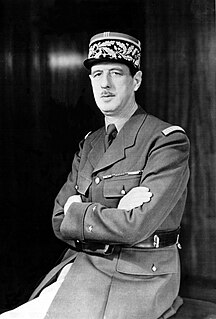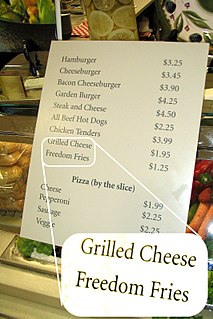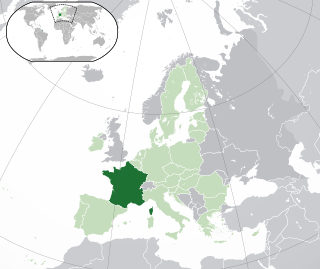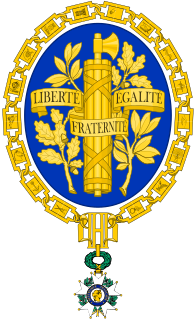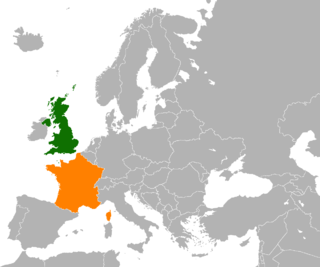By region
Though French history in the broadest sense extends back more than a millennium, its political unity dates back from the reign of Louis XI, who set up the basis of nation-state (rather than a dynastic, transnational entity typical of the late Middle Ages). In the last days of the Ancien Régime, only aristocrats and scholars spoke French in much of the kingdom, as about two-thirds of the population spoke a variety of local languages, often referred to as dialects. Henceforth, Eric Hobsbawm argues that the French nation-state was constituted during the 19th century through conscription, which accounted for interactions between French citizens coming from various regions and the Third Republic's public instruction laws, enacted in the 1880s, probably in parallel with the birth of the European nationalisms.[ citation needed ]
Europe
Britain
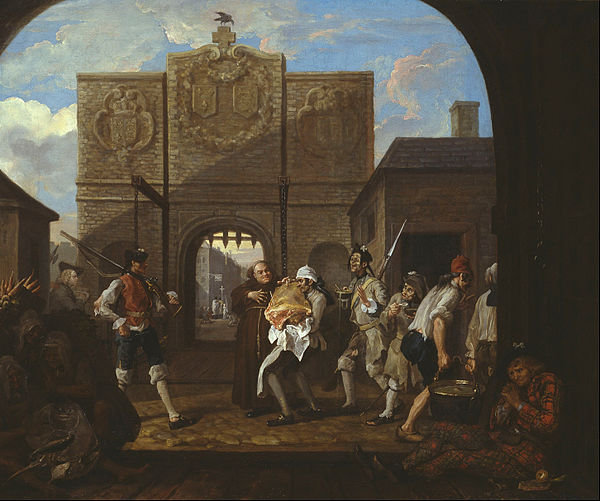
England and France have a long history of conflict, dating from before the Battle of Hastings, when William the Conqueror claimed the English throne. Before becoming King of England, William found conflict with his liege several times and conquered some neighbouring fiefs. The relationship between the countries continued to be filled with conflict, even during the Third Crusade. The medieval era of conflict climaxed during the Hundred Years' War, when the House of Plantagenet fought unsuccessfully for control of the French throne and lost almost all French holdings, which resulted in future English kings being more culturally English. (Previously, they had largely spoken French and lived in French castles much of the time. Richard the Lionheart, who was famous for his feud with French King Philip, spent most of his life in France and as little as six months of his reign as King in England).
The modern history of conflict between the two nations stems from the rise of England into a position as a dominant mercantile and seafaring power from the late 17th century onward. Hostility toward and strategic conflict with France's similar ambitions became a defining characteristic of relations between the two powers. The time between the Glorious Revolution of 1688 and Napoleon's final capitulation in 1815 has been perceived in Britain as a prolonged Franco-British conflict to determine who would be the dominant colonial power (sometimes called the Second Hundred Years' War ). British hostility to the Catholic Church, which dated back to earlier conflicts with Spain and the Catholic Habsburg dynasty, contributed to attitudes towards the French because France was also seen as a Catholic power, and the majority of the British people were Protestants. Britain assisted continental European states in resisting French ambitions to hegemony during the reign of Louis XIV and the Napoleonic Wars. Britain also resented France's intervention in the American Revolutionary War. The repeated conflicts spawned deep mutual antagonism between the two nations, which were only and partially overcome by their alliance to defeat Imperial Germany in the early 20th century.
The dimensions of the conflict in Britain were as much cultural as strategic. Indeed, British nationalism, in its nascent phases, was in large part an anti-France phenomenon and the attitudes involved extended well beyond who won what on various battlefields:
- A growing group of British nationalists in the 17th and 18th centuries resented the veneration that was often accorded the French culture and language.[ citation needed ]
- France was the strongest Catholic power and "Anti-Catholic" sentiments had been widespread in Britain since the Act of Supremacy in 1534.
- The permeation of anti-French sentiment throughout society, as epitomised by the apocryphal story of the Hartlepool monkey hangers, whose belief that the French were literally inhuman led them to have allegedly executed a pet monkey in the belief that it was an invading Frenchman, but the story is based upon the disputed premise that those involved had never seen a Frenchman before.[ citation needed ]
Robert Graves wrote shortly after the First World War during his time at Oxford University as an undergraduate that:
The eighteenth century owed its unpopularity largely to its Frenchness. Anti-French feeling among most ex-soldiers amounted almost to an obsession. Edmund, shaking with nerves, used to say at this time: "No more wars for me at any price! Except against the French. If ever there is a war against them, I'll go like a shot." Pro-German feeling had been increasing. With the war over and the German armies beaten, we could give the German soldier credit for being the most efficient fighting man in Europe ... Some undergraduates even insisted that we had been fighting on the wrong side: our natural enemies were the French.
The concerns were not unique to Europe. Despite the positive view in some of the United States, the revolution awakened or created anti-French feelings among some members of the Federalist Party. [3]
Germany
Beginning with the French invasions of Germany in the late 18th century, France became the century-long rival of Germany. The rising German nationalist movement also considered France their greatest enemy because France not only had temporarily conquered much of Western Germany during the Napoleonic Wars but also was the country most strongly opposed to the idea of a unified German empire and wanted Germany to remain divided into many individual states.
In this time, the myth of the so-called hereditary enmity (German: Erbfeindschaft) came into being, according to which the Romanic French and the Germanic Germans had been antithetic enemies ever since the Battle of the Teutoburg Forest, a notion that was inherently unhistorical. In the 19th century, anti-French sentiment became commonplace in German political discourse even if the deep cultural interrelation between the two could never be blanked out completely. (Johann Wolfgang von Goethe poked fun at this in his epic Faust I with the verse: Ein echter deutscher Mann mag keinen Franzen leiden, doch ihre Weine trinkt er gern. "A real German man likes no Frenchy, but he likes to drink their wines.")
Several German nationalist anthems were written against the French, most prominently Die Wacht am Rhein . After the German victory in the Franco-Prussian War in 1871, the anniversary of the decisive Battle of Sedan was made a semiofficial national holiday in the German Empire.
After the culminations of Franco-German enmity in both world wars, the two actively gave up their mutual animosities in the second half of the twentieth century. The most prominent symbol of this development is the picture of heads of government François Mitterrand and Helmut Kohl holding each other's hands at a ceremony at the military cemetery in Verdun in 1984. Today, Germany and France are close political partners and two closely connected nations. A joint Franco-German television network, Arte, was founded in 1992.
Ireland
Historically, relations between French and Irish have been generally positive, as both peoples shared a common religion, Roman Catholicism, and a common Protestant enemy, England (later the United Kingdom). French kings during the 16th to 19th centuries often supported Irish and Scottish interests against English advances in Ireland and Scotland.
Recently, there have been a few instances of friction between France and the Republic of Ireland over political and economic issues that led to expressions of Irish francophobia. One of these was when Ireland rejected the Lisbon treaty in a referendum in 2008 and Nicolas Sarkozy commented that Ireland "must vote again" [4] – as it indeed did the following year. Another source has been the French criticism of Ireland's low corporate taxation rate and the perceived French resistance to conceding an interest rate reduction on the International Monetary Fund/ European Union loan arrangement until Ireland "moves" on this rate, which was perceived as interference. [5]
Francophobia in Ireland rose in the aftermath of a controversial FIFA World Cup playoff game between the two countries, leading to protests outside the French Embassy in Dublin. [6] Irish businesses exploited the occasion in a mostly light-hearted way, with promotions offering discounts for every goal scored against France and special reductions to celebrate the elimination of France from the tournament. [7] [8]
Spain

Goya painted several famous pictures depicting the violence of the Peninsula wars during the Napoleonic Era. In particular, the French actions against Spanish civilians during the Peninsular War drew a large amount of criticism, as illustrated by The Third of May 1808 painting.
Africa
The French colonial empires earned many enemies, among rival colonial countries, especially the British empire, especially by colonised peoples. However, French neocolonialism is denounced under the term of Françafrique including by sectors of the French population itself.[ citation needed ]
Congo
- France's intervention in the civil war in Côte d'Ivoire has triggered anti-French violence by the "Young Patriots" and other groups.[ citation needed ]
Rwanda
Asia
Vietnam
- French colonists were given the special epithet thực dân (originally meaning colonist but evolving to refer to the oppressive regime of the French) in Vietnamese; it is still universally used in discussions about the colonial era. After the French were pushed out of Vietnam, those who collaborated with them (called tay sai – agents) were vilified. Those who left for France with the French were known as Việt gian (Viet traitors) and had all their property confiscated. Although anti-French feelings in Vietnam have abated, the use of words like thực dân (colonist) to describe the French is still common.[ citation needed ]
China
- During the 1884 Battle of Tamsui, the Chinese took prisoner and beheaded 11 French marines, who were injured, in addition to La Gailissonniere's captain Fontaine and used bamboo poles to display the heads in public to incite anti-French feelings in China pictures of the decapitation of the French were published in the Tien-shih-tsai Pictorial Journal in Shanghai. [9]
America
United States
Despite a large French contribution to the 1991 Iraq Gulf War (called Operation Daguet) and the French presence in Afghanistan (Operation Enduring Freedom), the opposition of French President Jacques Chirac to the 2003 Iraq War led to a significant rise in anti-French sentiment in the United States, [10] epitomized by a movement to rename french fries to freedom fries. [11] In March 2003, the cafeteria of the United States House of Representatives had its French fries and French toast renamed to freedom fries and toast, at the direction of Representatives Bob Ney (R-Ohio) and Walter Jones (R-North Carolina). Representative Ney chaired the Committee on House Administration and had authority over the menu in the House cafeteria. [12]
The freedom fries renaming was not without controversy or opposition. Timothy Noah of Slate noted that the move was "meant to demonize France for its exasperating refusal to support a war against Iraq". He compared the 2003 renamings to the renaming of all things German in World War I, but argued that the freedom fries episode was even worse because "Germany, after all, was America's enemy, whereas France is America's NATO ally." [13] The episode occurred despite the fact that neither french fries nor french toast are typically French (see origins of french fries and french toast), with American people and politicians being driven intentionally or unintentionally by the name confusion.
The swell of anti-French sentiment in the United States resulting from 2003 episode was marked. [14] Various media personalities and politicians openly expressed anti-French sentiments; [15] News Corporation's media outlets, particularly the Fox Entertainment Group's Fox News Network, were specifically implicated in a campaign fanning francophobia at the time of the war. [16] [17]
Oceania
New Zealand
France controls several islands in the Pacific Ocean New Caledonia, Wallis and Futuna Islands and French Polynesia. There have been sporadic independence demonstrations in French Polynesia, and briefly in the 1980s a pro-independence insurgency in New Caledonia, led by the Front de Libération Nationale Kanak Socialiste. However, the situation is by no means unique to France, as the other overseas European Great Power, the United Kingdom, also owns many British overseas territories and the controversies they generate.
There is also the issue of nuclear testing in the Pacific. Since 1960, around 200 nuclear tests have occurred around the Pacific, to the opprobrium of other Pacific states, Australia and New Zealand. In 1982, New Zealand reggae band Herbs released their breakthrough single, "French Letter", which strongly criticised French nuclear testing. [18] The end of the Cold War led to a French moratorium on nuclear testing, but it was lifted in 1995 by Jacques Chirac. French security forces have sought to interfere with the activity of nuclear testing protesters.[ citation needed ] In 1972, the Greenpeace vessel Vega was rammed at Moruroa. The following year Greenpeace protesters were detained by the French, and the skipper claimed he was beaten. Also, in 1985 the French secret service bombed and sank the Greenpeace ship Rainbow Warrior in Auckland, New Zealand. Greenpeace had been a very vocal opponent of French nuclear testing in the Pacific. Australia ceased military cooperation with France and embargoed the export of uranium to France. Chirac's decision to run a nuclear test series at Mururoa on 5 September and 2 October 1995, just one year before the Comprehensive Test Ban Treaty was to be signed, caused worldwide protest, including an embargo of French wine. Riots took place across Polynesia, and the South Pacific Forum threatened to suspend France. [19]
Australia
Protesters demonstrated at the French embassy in Canberra, and the French honorary consulate in Perth was fire-bombed. The company Delifrance was forced to downplay its entry into the Australian market even if it was not a French company. The Herald Sun ran an article, "Why the French are Bastards." A group of Australians ran a full page advertisement in Le Monde , arguing that the opposition in Australia to French nuclear testing was strong, and large numbers of ANZAC soldiers who fell in France's defence in the First World War. Some authors in the French press replied by discussing Australia's own human rights record and its supposed ambitions to dominate the Pacific (one cartoon by Plantu portrayed an Australian wearing a very British bowler hat).[ citation needed ]



